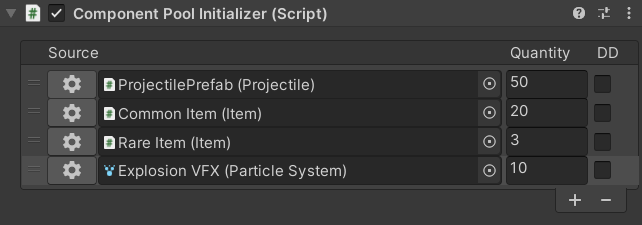com.jeffbert.unity-component-pool
v1.0.10
Published
Pooling system designed to work with Unity components. Reduces memory allocations by reusing disabled components.
Downloads
26
Maintainers
Readme
Unity Component Pool
Description
Pooling system designed to work with Unity components.
Installation
Install with Unity's Package Manager or by copying the repository's contents in your project.
Usage
Using the component pool essentially comes down to replacing Object.Instantiate calls with ComponentPool.Get. Component instances (created with ComponentPool.Get) are pooled by deactivating their corresponding game objects, allowing them to be reused on subsequent ComponentPool.Get calls.
Example
[SerializeField]
MyComponent sourceComponent;
MyComponent _instance;
void Awake()
{
// Retrieve pooled instance. A new instance will be created if the source component's pool is empty.
_instance = ComponentPool.Get(sourceComponent);
}
void Start()
{
_instance.DoSomething();
// Pool component instance by deactivating its game object.
_instance.gameObject.SetActive(false);
}Initializing instances
Component instances can be initialized with the ComponentPoolInitializer component. It's important to specify the component type that you want to pool, since pools are created per source component (and not per game object).

You can change the component that will be pooled by clicking the gear button.

Different types of components can be initialized within the same ComponentPoolInitializer component.

API
ComponentPool.Get
Get an instance of the source. A new instance will be created if the pool is empty.
[SerializeField]
MyComponent source;
void Awake()
{
MyComponent instance = ComponentPool.Get(source, transform.position, transform.rotation);
}ComponentPool.GetMany
Gets many instances in a single call.
ICollection: Adds the specified amount of instances to the collection.
[SerializeField]
MyComponent source;
private List<MyComponent> _instances = new List<MyComponent>();
void Awake()
{
ComponentPool.GetMany(_instances, source, 10, transform.position, transform.rotation);
}Array: Replaces all elements of the array with instances.
[SerializeField]
MyComponent source;
private MyComponent[] _instances = new MyComponent[10];
void Awake()
{
ComponentPool.GetMany(_instances, source, transform.position, transform.rotation);
}ComponentPool.DestroySourceInstances
Destroys all component instances of the specified source and clears the source's pool.
[SerializeField]
MyComponent source;
[SerializeField]
MyComponent otherSource;
void Awake()
{
MyComponent instance = ComponentPool.Get(source);
MyComponent otherInstance = ComponentPool.Get(otherSource);
ComponentPool.DestroySourceInstances<MyComponent>(source);
Debug.Log(instance == null); // True
Debug.Log(otherInstance == null); // False
}ComponentPool.DestroyInstances<T>
Destroys all component instances of the specified T type and clears all T pools.
[SerializeField]
MyComponent source;
[SerializeField]
MyComponent otherSource;
void Awake()
{
MyComponent instance = ComponentPool.Get(source);
MyComponent otherInstance = ComponentPool.Get(otherSource);
ComponentPool.DestroyInstances<MyComponent>();
Debug.Log(instance == null); // True
Debug.Log(otherInstance == null); // True
}